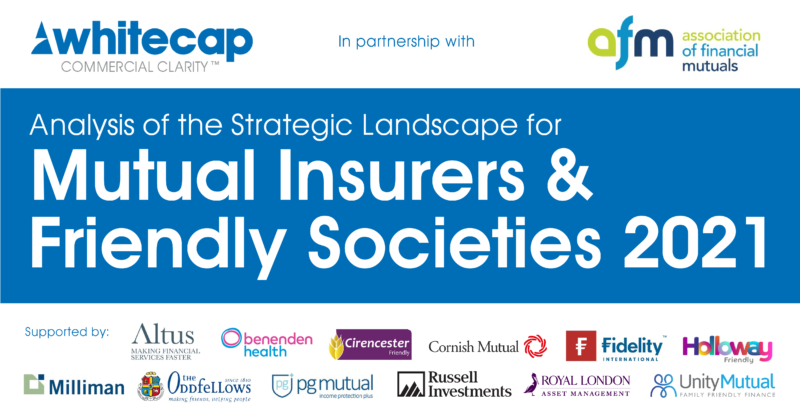Collaboration opportunities for Financial Mutuals
Collaboration opportunities for Financial Mutuals
24 January, 2022
Whitecap Consulting, in partnership with the Association of Financial Mutuals (AFM), recently published a report analysing the strategic landscape for financial mutual organisations in the UK. The Whitecap team is summarising the key findings in a series of blogs.
In this article, Julian Wells and Chloe Thompson, of Whitecap Consulting, examine the extent to which collaboration can be seen across organisations within the AFM membership and discuss some of the associated challenges. They also highlight examples of collaborative relationships across the membership and identifies potential areas of opportunity for collaboration in the future, including cross-sector collaboration with other mutual organisations, posing three key questions to the CEOs.

The key report findings relating to collaboration are outlined below:
Communication and engagement between AFM members appear to be strong, although collaboration on technology is limited.
With regards to collaboration, the interviews conducted with CEOs throughout our research highlighted that communication and engagement between AFM members appears to be strong. However, the appetite for working together on technology solutions currently appears to be limited. One third of the CEOs interviewed explicitly stated that they would not be open to collaboration that involved technology or IT systems due to it being a competitive activity. As well as this, a number of AFM members perceive themselves to be so distinct in terms of their IT systems, they do not consider it would be feasible to find solutions that satisfy all the needs of the parties involved.
Interestingly, data from the online survey conducted for the report contradicted this finding, with 71% of AFM respondents stating that they would potentially be interested in collaborating on technology solutions in the future. However, only 45% of respondents believe that collaboration on technology will actually happen. This suggests that although there may be some interest from AFM providers to collaborate, in reality, perhaps due to failed attempts in the past, less than half believe that it would come into fruition.
Views from outside the AFM membership are generally in support of the potential benefits of tech collaboration.
There is a sense from outside the AFM membership that there may be a missed opportunity with regards to the lack of collaboration on technology with particular reference to the potential for reducing the costs and operational burdens that AFM members face. There is also a sense from outside the sector that AFM members may perceive their tech needs to be more distinct than they actually are, particularly for those operating in the same market segments. According to Deloitte, “mutual insurers will need to collaborate, both within the sector and externally, to find a collective path through the challenges faced.” However, due to failed attempts to collaborate in the past and the cautiously competitive nature of the AFM membership, CEOs do not appear to prioritise this in their strategic thinking for the future when considering how to remain competitive in their wider markets.
There appears to be more openness towards the opportunity of knowledge and resource sharing, for non-competitive.
There does appear to be more openness within the AFM membership towards the opportunity for knowledge transfer and resource sharing as operational activities such as actuarial and risk and compliance are considered to be non-competitive. This is particularly relevant for smaller AFM members that lack the resources to do this internally or the scale to outsource to third parties that only serve larger organisations. That being said, there are multiple examples across the AFM membership of outsourcing non-competitive utilities to third-party providers. It is also important to note that collaboration in the form of knowledge transfer may be more appropriate and just as beneficial for some AFM members than collaborating on project delivery as the difficulties in trying to align the objectives and satisfy the different boards may be unattainable.
The Regis Management Model provides an interesting example of collaboration in the form of shared services within the sector.
The Regis Mutual Management Model provides an interesting example of collaboration within the AFM membership. As a limited company, Regis offers a fully integrated service to their clients from creating mutuals to day-to-day management. Each Mutual has a designated Mutual Manager appointed from the Regis team. The Mutual Manager provides the link between the Mutual and each of the functions that Regis carries out for the Mutual. Functions that Regis provides include finance and accounts, insurance and reinsurance programmes, IT solutions, marketing services, claims handling, governance and compliance and risk management. Of the AFM membership, Regis manages Activities Industry Mutual, The Retail Mutual and The Livery Companies Mutual.
There is potential for cross-sector collaboration between the AFM membership and building society sector with particular reference to how mutuals could openly share knowledge and coordinate activities.
In a joint report by the two leading trade bodies representing the financial mutual sector (AFM & BSA), the potential for inter-firm collaboration is discussed with particular reference to how mutuals could openly share knowledge and coordinate activities so that individual organisations can share the benefits and no single organisation is disadvantaged. According to the report, one of the most significant tasks involved in establishing and sustaining such cross-sector collaborations would be to agree on a set of values and principles which is where mutuality is viewed as a resource which the sector could utilise and deploy in establishing values-based governance, developing integrated leadership and co-creating a new business model. Barriers that were identified in the report to inter-organisational collaboration centred on mutuality include the UK’s regulatory environment being increasingly focused on the individual organisation as an object to be regulated, and preferred Plc ownership. At the same time, management and members/customers of financial mutuals may be keen to preserve operational independence of their mutual as there may also be trust issues between management of different financial mutuals as to their motives for collaboration.
Questions for CEOs and Leadership Teams: Collaboration
- Have you considered coming together within your market segments to evaluate the extent to which your IT requirements differ, in order to explore the possibility of clusters sharing parts of their IT solutions?
- To future proof your organisation, have you considered the benefits of pooling non-competitive resources to mitigate rising costs such as regulation?
- Have you explored all the potential opportunities to engage in referral/ introducer relationships with other AFM members for products/ services that complement your current offering or better serve the needs of your target market?
This is the sixth in a series of blog posts that focus on key themes addressed in the research. The topics are covered in more detail in the report which you can download via the link below.
Background to report:
Analysis of the Strategic Landscape for Mutual Insurers & Friendly Societies 2021
The research underpinning the report was conducted by Whitecap Consulting in partnership with the AFM and involved a quantitative data analysis of all 43 Mutual Insurers & Friendly Societies, interviews with 31 of the CEOs, and an online survey which received a total of 61 respondents.
The project was conducted in partnership with the AFM with support from industry sponsors including: Altus Consulting, Benenden Health, Cirencester Friendly Society, Cornish Mutual, Fidelity International, Holloway Friendly, Milliman, Oddfellows (which includes Unity Mutual), PG Mutual, Russell Investments, and Royal London Asset Management.
Useful Links:

